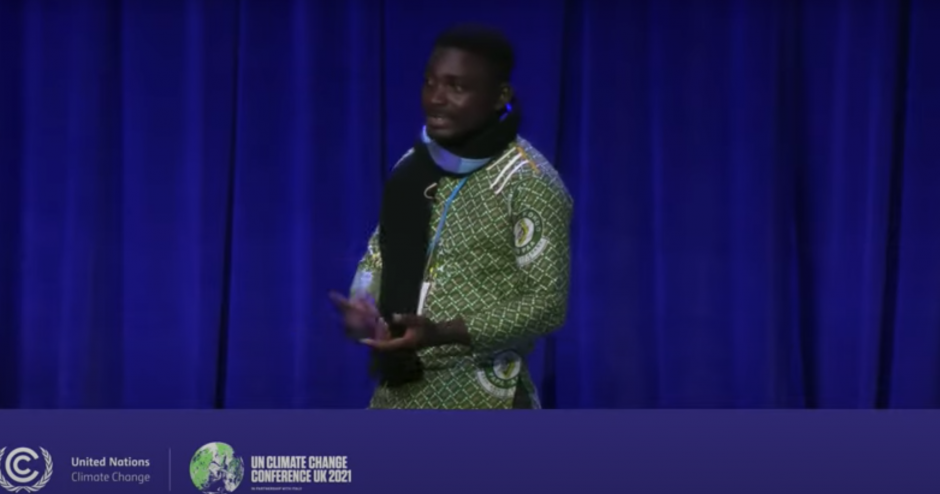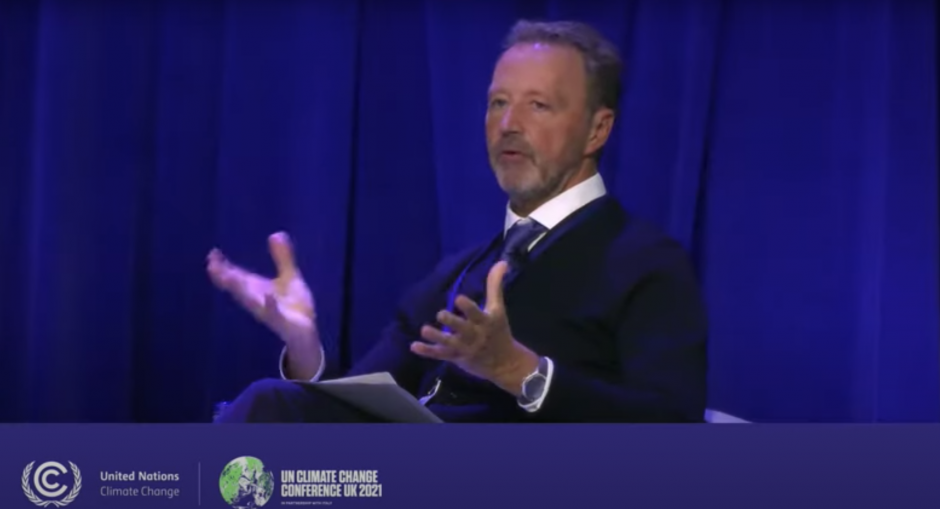Co-operation is a key tool in helping farmers in developing countries develop sustainable practices to tackle climate change, delegates at COP26 were told.
Steve Murrells, chief executive of the UK’s Co-op Group, said: “The theme of this conference is it has to be one of collaboration and co-operation and the truth is that not one country not one leader, not one business can deal with this climate issue on our own.”’
Mr Murells was on a panel – which included fellow co-operator Bismark Kpabity from Ghanaian cocoa co-op producers’ union Kuapa Kokoo – for a session looking at ways to “put farmers first for fair resilience in cocoa“.
Melissa Duncan, executive director of Fairtrade International, told the session: “Fairtrade farmers are at the frontline of the global climate crisis but our planet’s farmers are far from victims – they are integral and a key to climate solutions.”
Fairtrade International has been working with Vrije University, Amsterdam and Bern University of Applied Sciences on a climate impact report, she said.
“The outcome from this is that there is going to be major impact from occurrence and dry periods, heat waves and extreme rainfall,” she explained. “Of course, this varies by product and by region. And the report is a very rich source of data for us to use and ensure that we can help to invest in the right places and give us our best strategies for climate adaptation and an overall resilience really mitigation as well.”
But she warned: “There will be no sustainable cocoa sector until farmers are earning a living income. This is a human right and a precondition to accessing other human rights.”
To that end, Fairtrade is working on living standards, working standards, growth and policy advocacy, she said.
Bismark Kpabity said the economic hardships of cocoa farming mean it is hard to attract young workers – and the impact of climate change on productivity is making this worse.

Half a tonne of cocoa from of a hectare is seen as a good yield, he said, although this is poor – and leaves farmers with no money to diversify their business or develop their assets.
In turn this makes it harder to put climate measures in place. The climate crisis is also bringing home the realities of food production, which urban consumers have long been divorced from.
“I know most of you enjoy chocolate so much,” said Mr Kpabity. “But you may ask how does it come to you – through what process do the beans come to the factories to manufacture the chocolate?”
This includes environmental impact, he said – adding that there is still hope to put a sustainable system in place “but action needs to be taken now”.
Kuapa Kokoo is putting sustainable methods in place, he told delegates, with an agroforestry drive to plant new trees, revive barren land and “make sure cocoa lives in its natural habitat”.
Dr Emmanuel Opoku, CEO of the Ghana Cocoa Board, said: “We need to recognise the impact of climate change on farmers.”
When climate hits production, farms become inefficient and poverty increases, he said – especially if it brings crop disease.
To build climate resilience, a farm where a disease breaks out has to be completely torn down and replanted with a resistant strain. In Ghana, 24,000 hectares of farms have been replanted, out of more than 200,000 hectares affected by disease.
Farmers cannot afford to do this so they need financial support, said Dr Opku. They are also being shown how to lift productivity using artificial pollination and irrigation.
This is a substantial investment which needs to be paid for – a controversial question, said Tony Simmons, head of the World Agroforestry Centre (ICRAF).
Related: UK co-ops pledge climate action ahead of COP26
Showing a slide of a barren former cocoa plantation, he asked: “How are we going to make that more resilient, more productive, more remunerative, more sustainable?”
One answer means moving away from monoculture, he added – but it is also important to recognise that the land was never vibrant or productive if it did not pay its farmers a living.
“Cocoa farming is a is a rich person’s indulgence for a poor person’s hard labour,” he said. “And we’ve got to shift that balance and change it,. Fairtrade to doing a great job … but we still have a huge leap to go.
“If we want to carry on eating cocoa we have to pay a fair price for it … and … manage the landscape in the right way.”
That means fixing problems around “the low farmer income, the social capital, the child labor issues – those are 70% of the problem,” he added.
Fairtrade certification should be more disruptive, he suggested. “You have to promise not to sell cocoa if it’s shipped in vessels that don’t report the carbon emissions. Oops, there goes the whole of Europe. Sorry.
“You’ve got to guarantee that you don’t sell it in countries that subsidise inorganic agriculture. Oops, there goes North America as well.
“And …you’ve got to guarantee us, guarantee, you won’t sell your chocolate to to to any racist customers because racism is a bad thing.”
Related: Climate change puts millions of Fairtrade farmers at risks, says new report
Talking through the history of the Co-op Group’s support for Fairtrade, Steve Murrells said his job as a retailer was to take the work of the other panelists, use it to put a product on his shelves, and to pay a fair price for it.
“We need to get other organisations to do same thing,” he added. “Consumers have indicated they are prepared to pay for it.”
The Group’s recent report on ethical consumerism shows that total ethical expenditure in the UK has broken through the £100n mark, he said. “If you look at the growth of Fairtrade over that same period that’s growing by 14%. So there is a real demand for products that are grown in this way … the door is opening, and that can only be a good thing.”

He said the Group’s relationship with Fairtrade “has been a very strong one. Other UK retailers have slightly erred to other certification relationships. My personal view is that Fairtrade remains the gold standard. It champions the things that are important to the Co-operative Group around paying a fair price, around empowering the producer, and giving them the chance to enjoy a sound and prosperous living.”
The Group is working to build on that, he added. “We’re very pleased to back the work that Fairtrade are now doing in Africa around climate sustainability in those key areas of tea and coffee. And I think that’s a continual example how we, as the largest co-operative in the UK, want to continue to make a difference.
“I think this is going to become more and more an obvious reality as we seek to heal the nation, and the planet: the prices of food production do warrant a greater payment for the likes of Bismark and other young producers.”
But on climate, he warned: “It’s no good for the Co-op’s plan to plan to be more sustainable than the Sainsbury’s plan or the Tesco plan or the Waitrose plan. We’ve got to find common solutions to common problems.”
The means working with progressive cocoa producers “so that collectively we can start to heal our planet, but time is running out”, said Mr Murrells.